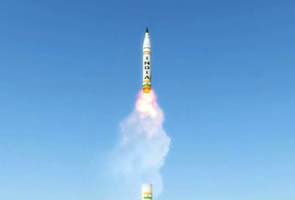 New Delhi: A big day for India's missile program. The country is getting ready to test fly its first Inter-Continental Ballistic Missile (ICBM) called Agni-V. A nuclear tipped three-stage missile - designed and developed by India's Defence Research And Development Organisation (DRDO) scientists - is scheduled to be launched today off the Orissa Coast in Wheeler Island from a mobile launcher at 7 pm.Here are the top 10 facts on the missile:
New Delhi: A big day for India's missile program. The country is getting ready to test fly its first Inter-Continental Ballistic Missile (ICBM) called Agni-V. A nuclear tipped three-stage missile - designed and developed by India's Defence Research And Development Organisation (DRDO) scientists - is scheduled to be launched today off the Orissa Coast in Wheeler Island from a mobile launcher at 7 pm.Here are the top 10 facts on the missile:1). India will break into the exclusive ICBM club of six countries including the United States, Russia, United Kingdom, China and France once the 50-tonne Agni-V is ready for induction by 2014-2015.
2). The Agni series of missiles, including Agni-V, is crucial for India's defence vis-a-vis China since Beijing has upped the ante in recent times by deploying missiles in Tibet Autonomous Region bordering India.
4). Once fired, it cannot be stopped. It travels faster than a bullet and can carry 1,000 kilograms of nuclear weapons. It can be launched using a special canister. Why, it can even be launched from a roadside!
5). With a range of 5,000 km, Agni-V, once validated and inducted into the armed forces after several more tests, will be India's longest-range missile to carry a nuclear warhead. It will have the capacity to carry a nuclear warhead weighing over a tonne.
6). Agni-V will give India the technological knowhow to launch many nuclear warheads using the same missile.
7). Agni-V can be configured to launch small satellites and can be used later even to shoot down enemy satellites in orbits.
8). It can be launched only on the direct orders from the Prime Minister. India hopes it turns out to be a weapon of peace, not war.
9). Seventeen metres tall, Agni-V's three-stages are powered by solid propellants. The first rocket engine takes it to a height of about 40 kilometres. The second stage pushes it to about 150 kilometres. The third stage takes it to about 300 kilometres above the Earth. The missile finally reaches a height of about 800 kilometres.
10). This will be India's first launch of a 5,000 km+ range missile.



No comments:
Post a Comment